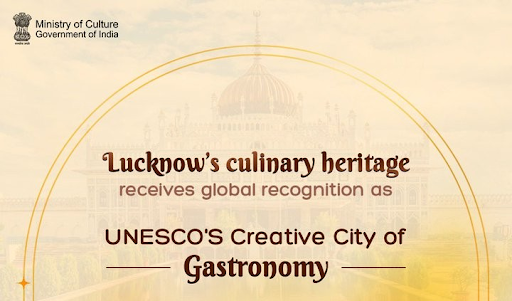
Disclaimer: Copyright infringement not intended.
Context
Kozhikode in Kerala has been designated as the UNESCO ‘City of Literature’ and Gwalior as the ‘City of Music’ in the latest UNESCO List of Creative Cities Network.
Details
UNESCO Creative Cities Network
- The UNESCO Creative Cities Network (UCCN), established in 2004, serves as a flagship initiative fostering international cooperation among cities committed to leveraging creativity as a strategic factor for sustainable urban development.
- Encompassing seven creative fields, this network aims to promote cultural diversity and stimulate innovative solutions to contemporary urban challenges.
Objectives and Significance:
- Encouraging the development of creative industries and cultural entrepreneurship in member cities.
- Facilitating the exchange of best practices, knowledge, and resources among creative communities worldwide.
- Promoting cultural heritage preservation, urban regeneration, and sustainable development through creative initiatives.
- Elevating the global visibility and recognition of cities as vibrant hubs of creativity, innovation, and cultural expression.
Seven Creative Fields of the UCCN:
- Crafts and Folk Art: Recognizing traditional craftsmanship and indigenous artistic heritage.
- Design: Promoting design innovation, urban planning, and sustainable development.
- Film: Celebrating cinematic excellence, cultural diversity, and storytelling through the medium of film.
- Gastronomy: Highlighting culinary traditions, food heritage, and sustainable gastronomic practices.
- Literature: Fostering literary exchange, promoting reading culture, and nurturing linguistic diversity.
- Media Arts: Embracing digital creativity, multimedia innovation, and technological advancement in arts.
- Music: Celebrating musical diversity, cultural heritage, and promoting music education and performance.

Membership and Collaborative Initiatives:
- Membership in the UCCN offers cities opportunities for cultural exchange, joint projects, and collaborative initiatives aimed at fostering sustainable development through creative endeavors.
- UCCN organizes various events, workshops, and cultural festivals, facilitating the exchange of ideas and experiences among member cities.
- Collaborative projects encompass areas such as cultural tourism, heritage preservation, creative education, and urban regeneration.
Kozhikode (Kerala)
- Cultural Heritage: Kozhikode, also known as Calicut, boasts a rich cultural heritage dating back centuries, contributing significantly to Kerala's vibrant cultural landscape.
- Historical Significance: With a storied past as a major trading port for spices during the medieval period, Kozhikode has retained its historical significance and charm.
- Culinary Delights: The city is renowned for its delectable Malabar cuisine, offering a tantalizing array of flavors and spices, including the famed Malabar biryani and fresh seafood delicacies.
- Literary Hub: Kozhikode nurtures a thriving literary community and hosts vibrant literary festivals, emphasizing its status as a hub for intellectual discourse and creative expression.
- Natural Beauty: Nestled amidst serene beaches and verdant landscapes, Kozhikode offers a tranquil escape, inviting visitors to immerse themselves in the region's natural beauty and cultural richness.
Gwalior (MP)
- Historic Grandeur: Gwalior's illustrious history is epitomized by the majestic Gwalior Fort, a testament to the city's royal past and architectural brilliance.
- Musical Legacy: The city is synonymous with the renowned Gwalior Gharana, contributing significantly to the realm of Hindustani classical music and fostering a rich musical tradition.
- Cultural Festivals: Gwalior hosts vibrant music festivals and cultural events, showcasing its deep-rooted musical heritage and providing a platform for local and renowned musicians to enchant audiences.
- Architectural Marvels: Gwalior's captivating palaces and intricately designed temples reflect the city's architectural splendor and serve as poignant reminders of its regal history and cultural legacy.
- Cultural Hub: The city's vibrant cultural scene, marked by its musical legacy, historical significance, and architectural marvels, positions Gwalior as a significant cultural hub in the heart of India.
The Significance of Creativity in Urban Development
Driving Sustainable Development:
- Creativity serves as a catalyst for sustainable urban development, fostering innovation and promoting social cohesion.
- Culturally rich and innovative cities are better equipped to address pressing global challenges such as the economic crisis, environmental impact, and social tensions.
Urban Centers as Hubs of Activity:
- With over half of the global population residing in cities, these urban hubs are vital for economic growth and innovation, including the flourishing creative economy.
- Cities act as vibrant cultural melting pots, nurturing diverse communities and fostering intercultural dialogue.
Role in Sustainable Development Goals (SDGs):
- The 2030 Agenda for Sustainable Development recognizes the pivotal role of cities in creating inclusive, safe, and resilient human settlements.
- Culture and creativity are highlighted as essential drivers for achieving sustainable urban development in line with the SDGs.
Local Implementation of Cultural Practices:
- Local communities actively engage with culture and creativity, emphasizing the need for robust support from public authorities, private sectors, and civil society.
- Fostering cultural industries, encouraging citizen participation, and promoting creative initiatives contribute to more sustainable urban practices.
UNESCO Creative Cities Network as a Catalyst for Change
Facilitating Knowledge Exchange:
- UCCN enables cities to collaborate and share experiences, fostering peer learning and knowledge transfer.
- Cities leverage the network's resources to enhance their creative assets and develop sustainable, inclusive, and balanced urban development strategies.
Encouraging Collaborative Projects:
- The network serves as a platform for joint initiatives and collaborative projects, allowing cities to harness their creative potential for holistic development.
- By pooling resources and expertise, cities can devise innovative solutions to common challenges, promoting economic, cultural, environmental, and social progress.
Promoting Sustainable and Inclusive Development:
- UCCN emphasizes the importance of sustainable, inclusive, and people-centric urban development, aligning with UNESCO's mission to foster cultural diversity and heritage preservation.
- By harnessing the power of creativity, cities can build a more resilient, equitable, and culturally vibrant future for their residents.
UNESCO: United Nations Educational, Scientific and Cultural Organization
Overview:
- Founding: Established in 1945, UNESCO is a specialized agency of the United Nations aimed at promoting peace and security through international cooperation in education, science, and culture.
- Mandate: Its core objectives include fostering global educational development, safeguarding cultural heritage, promoting scientific research, and advocating freedom of expression and media freedom worldwide.
- Global Initiatives: UNESCO spearheads various initiatives, including the World Heritage Sites program, the Education for Sustainable Development program, and the Global Geoparks Network, to promote cultural understanding, environmental conservation, and sustainable development.
Mission and Values:
- Cultural Preservation: UNESCO works to preserve cultural diversity and heritage worldwide, emphasizing the importance of protecting historical sites, traditions, and languages for future generations.
- Educational Development: Through various educational programs and initiatives, UNESCO advocates for accessible and quality education, aiming to eradicate illiteracy and provide learning opportunities for all.
- Scientific Advancement: The organization promotes international scientific cooperation, research, and knowledge-sharing, addressing global challenges such as climate change, biodiversity conservation, and sustainable development.
- Media Freedom and Ethics: UNESCO advocates for press freedom, media development, and the safety of journalists, emphasizing the critical role of independent and ethical media in fostering informed societies and democratic governance.
.jpg)
Conclusion
The UNESCO Creative Cities Network stands as a testament to the transformative power of creativity in shaping vibrant, inclusive, and sustainable cities. By fostering collaboration, cultural exchange, and innovation, the network continues to pave the way for a more interconnected and creative global community, transcending geographical boundaries and fostering a shared vision of cultural diversity and sustainable urban development.
|
PRACTICE QUESTION
Q. Discuss the role of UNESCO's Creative Cities Network (UNCCN) in fostering cultural diversity and sustainable urban development. Illustrate the significance of UNCCN's initiatives in promoting global cooperation and exchange of best practices among member cities. (250 Words)
|















